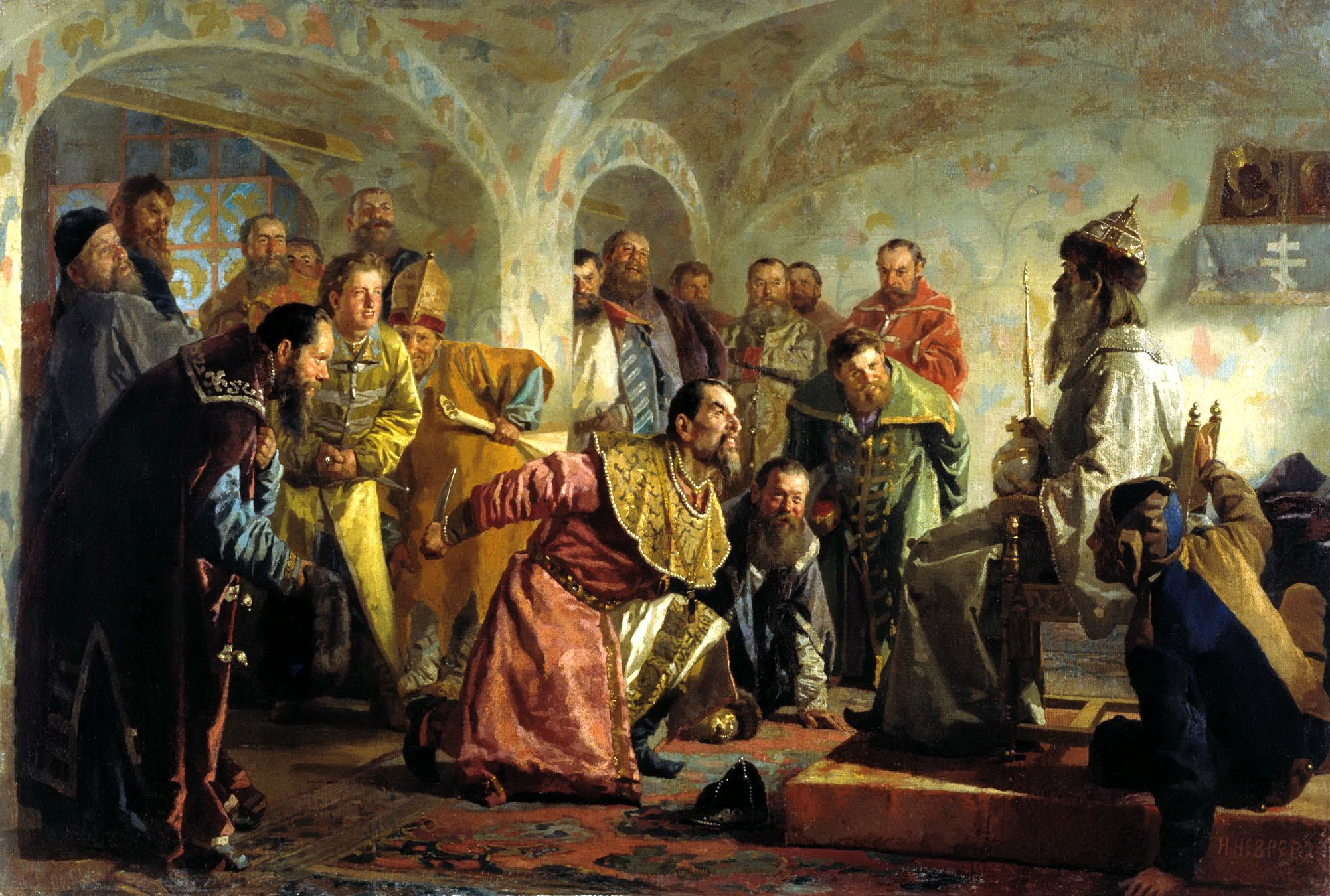
There is a great painting by Nikolai Nevrev called Oprichniki. It depicts a terrible scene in which a pack of wolves are taunting a stubborn goat. The wolves are the members of the oprichnina, a secret police force created by Ivan the Terrible to pursue and execute potential dissidents, and the goat is the boyar Fyodorov, a challenger to the throne. In an act of cruel mockery, the oprichniki force Fyodorov to sit on the throne, moments before he is executed. The boyar is dressed as a tsar, complete with a golden orb and scepter, and the assailants gather round, bowing and kneeling before their mark. “Here is your throne”, their sneering and jeering faces seem to say – “is *this what you wanted?”*
In one way the painting is an exposé of human malice, cruelty and weakness. While the artist at first appears to be standing aside, facing the two parties so that each lies evenly on his left and his right, the point of view is actually slightly shifted in the direction of the victim so that we are looking at the scene from behind him, not from the front. This means that the viewer is actually looking at the assailants, and not at Fyodorov, as everybody else is. What unfolds is a canvas of faces, some jeering and sneering, some scowling, some laughing, some uncertain. Only two faces aren’t looking at the “tsar”. One is the jester, looking back at the crowd, mirroring their sneer back at them. The other is looking away, plunged into dark thoughts of reflection and perturbation, feeling the cold chains of conscience.
The man at the front of the pack is kneeling in front of Fyodorov with a dagger behind his back. He isn’t smiling, but snarling. The malice doesn’t come from idleness or depravity, it comes from hatred. This man hates the one on the throne. There is no need for this show, they could have killed the dissident long ago – the show is an attack, a strike against something that every member of the group lacks. The wolves in the room have power – the power to pursue, to prosecute, to kill – but yet every one of them is still a servant of a higher master, their tsar Ivan. The man who they are mocking has what they can never have and what they will never have the courage to pursue, and they hate him for it. He will be killed, yes, but he will die a free man, while his killers will spend the rest of their lives in chains.
In a way this painting conjures parallels to what Theodore Roosevelt once said about the man in the arena:
It is not the critic who counts; not the man who points out how the strong man stumbles, or where the doer of deeds could have done them better. The credit belongs to the man who is actually in the arena, whose face is marred by dust and sweat and blood; who strives valiantly; who errs, who comes short again and again, because there is no effort without error and shortcoming; but who does actually strive to do the deeds; who knows great enthusiasms, the great devotions; who spends himself in a worthy cause; who at the best knows in the end the triumph of high achievement, and who at the worst, if he fails, at least fails while daring greatly, so that his place shall never be with those cold and timid souls who neither know victory nor defeat.
Doing always invites prosecution because you dare to jump ahead of the pack. The weak gather round, much like those oprichniki in the painting, and place the challenger on a pedestal, thereby preparing the target for their attack by giving everyone the chance to take a shot at him. They laugh, they sneer, they jeer and they stab you until you bleed. They want you to stop, to get back into their ranks, for what they fear is not your success but the confirmation of their failure. As you realize your dream, you show them what they could have been but are not, what they could do, but did not – could not. The further you move ahead, the greater the hatred they will feel for you, for it is the distance between you that materializes their “could not”. The ambitious will be inspired, the envious demoralized.
There is another lesson in the painting. While Fyodorov could be said to have become “tsar”, he was only a tsar for a moment before he was killed. In this way the painting is a tragedy on both sides – weakness transforming itself into malice on the one, lack of foresight and preparation on the other. The dissident wanted power, but he could not maintain it. A goat cannot become the leader of a pack of wolves, however stubborn or sure of himself he may be. There is a difference between wanting something and getting it. Acting on the former might get you results, but it might also end in the situation depicted by Nevrev. Getting what you want involves not only obtaining it, but also keeping it. Desire and ambition are the causes, but it is only when coupled with reason, research and strategy that their energy fuels lasting change rather than dissipating or causing the destruction of the source. Arm yourself before you enter the arena, and pick the battles you fight so that their outcome can be decided before they even begin.